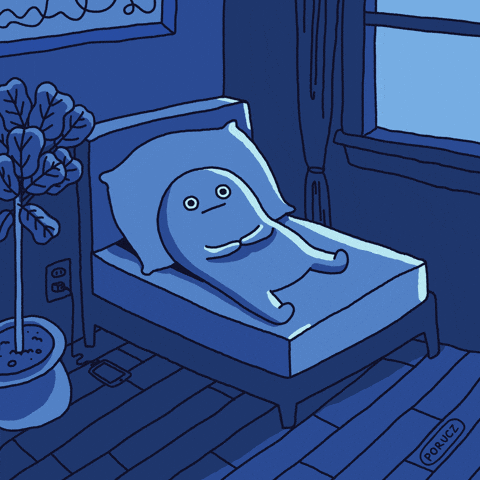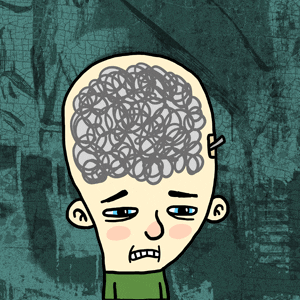How can I overcome social anxiety?
Somehow, the ages of around 12 to 18 are just filled with all kinds of imbalances in emotions, hormones, and relationships, which naturally produces anxiousness, awkwardness, and general feelings of weirdness. Everything is new—experiences, opportunities, interactions with others...
During this stage of life, we suddenly become more aware of what's going on in the world politically and socially. Having lived through the 2020 pandemic also brings along its own layers of dread about the unknown.1 We may also feel pressured to fulfill perceived expectations or have life all figured out just because we're older. Social anxiety can be a particularly big stressor for teens because of our developing brain chemistry and our increased sensitivity to others' perceptions of us.2, 3

Anxiety vs. Social Anxiety4, 5
In the U.S., anxiety disorders are the most common of mental disorders among ALL ages with varying levels of severity. While some can still function relatively well with their anxiety, others are disabled by its lasting effects on their mental and physical health.
Social anxiety is a particular type of anxiety disorder, referred to as Social Anxiety Disorder or sometimes "social phobia." Typical anxiety is the fear that rises in us over the anticipation of an event but then subsides when the real or perceived danger has passed.
Social Anxiety Disorder or social phobia is an often chronic, irrational fear of certain objects, people, or situations. For those who have Social Anxiety Disorder or struggle with generalized anxiety disorder, the mind plays a persistent loop of fearsome scenarios of being hurt, humiliated, or scrutinized by others.
Social Anxiety & Social Media / Digital Use6
Our social media use and digital habits may be partially to blame for the growing social anxiety epidemic. Through views, likes, and follows (or lack thereof), we feel as though we're getting confirmation on what people really think of us.

We're afraid to express ourselves for fear of rejection, which is actually a normal part of this stage of life. It's just that social media turns up the volume on those insecurities 1000%. One study found that 48% of teens who spend five hours per day on a digital device have at least one suicide risk factor, compared to 33% of teens who spend two hours a day on an electronic device6. With all the news and information we have access to, it can be hard to limit our exposure to things—either good OR bad.
The activity of friends on social media can cause added pressure too. The FOMO and envy can get real real. We're living in a time when people can have access to us 24/7. When friends text or post, we may feel compelled to immediately reply, comment, like, or react to "prove" our friendship. We might worry that unplugging and detaching from social media will send a message that we don't care or want to bury our heads in the sand.
Social Anxiety & Perfectionism
For many who struggle with social anxiety, perfectionism is just one more thing to wrestle with. The temptation to pressure ourselves to look a certain way or be the "best" can get overwhelming.
However, we must remember that Jesus alone is perfect (1 Peter 2:22), and, unlike the world, God looks at the heart rather than social standing, appearances, or levels of achievement (1 Samuel 16:7). Remember that if we're God's child, our security in Him can never be taken away (John 10:28-30). Our identity is eternally transformed and permanently tied to Him (2 Corinthians 5:17).

Social Anxiety & Judgment
Those of us suffering from social anxiety may fear the harsh, critical judgment of others because our personal view of ourselves (and likely others) is too harsh and critical. We may think that, like us, people are focusing on our perceived shortcomings, imperfections, or inadequacies.
In Luke 6:37, Jesus says, "Judge not, and you will not be judged; condemn not, and you will not be condemned; forgive, and you will be forgiven" (Luke 6:37). We ought to be merciful, forgiving, and loving toward the people around us (Luke 6:38)—and ourselves.
As we begin practicing more grace and less judgment, we can pray for God's wisdom and help to see ourselves as who He created us to be (James 1:5)—not as who we think we should be. Forgiving ourselves for our mistakes and knowing that God forgives us too is essential in learning to extend grace to ourselves (1 John 1:8-9).
Biblical Counseling for Social Anxiety
Many of us who suffer from social anxiety have a history of trauma, often with an overly controlling and/or critical parent. Over time, we can develop narratives about ourselves that are in opposition to Scripture, and we may not even realize this until someone else points it out.
In such cases, we may benefit from biblical counseling with an experienced, biblically minded counselor. It may be beneficial to look for a counselor who specializes in social anxiety. Essentially, we should seek a counselor who can:7
- Properly interpret and understand Scripture
- Emphasize key foundational truths like grace and redemption in Scripture
- Help us understand how passages are applicable and can help us with our unique situation
- Highlight the Holy Spirit's work in our life
We should also make sure that the counselor is able to give us the specific care we need for our situation. That may mean that you'll need to meet with more than one counselor before finding the right fit. By no means should you stay with a counselor who cannot or does not meet your needs. We should pick a counselor who can address our needs in a way that aligns with 1 Thessalonians 5:14: "And we urge you, brothers, admonish the idle, encourage the fainthearted, help the weak, be patient with them all."
Overcoming Social Anxiety: Practical Tips7, 8:

Challenge Negative Thoughts:
Ask yourself if the fear you have aligns with Scripture. If it doesn't, focus your thoughts on what is godly and beneficial to your life (Philippians 4:8).
Take Small Steps to Face Fears:
Go for a walk in a public park, challenge yourself to sit at a different pew at church, or go to the cashier instead of the self-checkout. While these things might feel scary at first, remember that if you are God's child, He is with you every step of the way (John 14:18).
Examine Social Media/Digital Use:
Examining how our social media/digital habits affect our mental, physical, and spiritual health is so important in taking control of how it affects us. If we find that scrolling Instagram reduces our mood or view of ourselves, then we can consider if we would feel better doing something else.
There are plenty of other activities that don't involve the same social pressures—such as hobbies, sports, reading, getting together with friends, etc. If we find that we're tempted to compare ourselves to others' pictures online, we can refocus our attention. We can choose to focus on encouraging others rather than comparing ourselves. We can remind ourselves of our new identity in Christ and remember that the world's standards of worthiness are invalid (2 Corinthians 5:17; Ephesians 1:3-6).
Ultimately, if we suffer from social anxiety, we should center ourselves on a biblical perspective about who we are and who God is. We don't have the power to overcome social anxiety on our own, but we do have a loving, merciful Savior who can help carry our burdens with us (Matthew 11:28-30)—including anxiety.
"Humble yourselves, therefore, under the mighty hand of God so that at the proper time he may exalt you, casting all your anxieties on him, because he cares for you." —1 Peter 5:6-7
ALSO SEE:
- How can I overcome anxiety?
- How can I overcome feelings of being overwhelmed?
- How can I overcome peer pressure?
- How to Do a Mental Health Check
- What does the Bible say about mental health?
- What does the Bible say about mental illness?
- How to Support a Friend with Anxiety
- What is religious OCD?
- Langston's Story
- Jenna's Story
- Should a Christian see a psychologist, psychiatrist, or counselor?
- How do I choose a good Christian counselor?
- Can a Christian take mental health meds?
- What does the Bible say about depression?
RESOURCES: 1. Jennifer Katzenstein, Ph.D. "Anxiety and Stress in Teens." The Johns Hopkins University. https://www.hopkinsmedicine.org/health/conditions-and-diseases/anxiety-disorders/anxiety-and-stress-in-teens [Accessed 3/28/25]. 2. Wayne State University. "Research study examines brain development among adolescents for potential predictors of anxiety." https://today.wayne.edu/news/2020/02/25/research-study-examines-brain-development-among-adolescents-for-potential-predictors-of-anxiety-35440 [Accessed 3/28/25]. 3. Somerville LH. "Special issue on the teenage brain: Sensitivity to social evaluation." https://pmc.ncbi.nlm.nih.gov/articles/PMC3992953/ [Accessed 3/28/25]. 4. Adam Felman. "What to know about social anxiety disorder." Medical News Today. https://www.medicalnewstoday.com/articles/176891 [Accessed 4/14/25]. 5. Leigh E, Clark DM. Understanding Social Anxiety Disorder in Adolescents and Improving Treatment Outcomes: Applying the Cognitive Model of Clark and Wells (1995). Clin Child Fam Psychol Rev. https://pmc.ncbi.nlm.nih.gov/articles/PMC6447508/ [Accessed 4/14/25]. 6. Leah Shafer. "Social Media and Teen Anxiety." Harvard Graduate School of Education. https://www.gse.harvard.edu/ideas/usable-knowledge/17/12/social-media-and-teen-anxiety [Accessed 4/14/25]. 7. Crystal Raypole. "Ready to Overcome Social Anxiety? These 8 Tips Can Help." Healthline.com. https://www.healthline.com/health/anxiety/how-to-get-over-social-anxiety#challenge-negative-thoughts [Accessed 4/14/25]. 8. Suffolk DBT. "Coping Strategies for Teen Social Anxiety in the Age of Social Media." suffolkdbtjl.com. https://suffolkdbtjl.com/coping-strategies-for-teen-social-anxiety-in-the-age-of-social-media/ [Accessed 4/14/25].


TL;DR
Social anxiety is a specific type of anxiety disorder and is often prevalent in the lives of teenagers due to things like societal pressures, neurological development, and the influence of social media influence and digital consumption. We should view ourselves and those around us through the lens of Scripture rather than falling into the pit of perfectionism or judgmentalism. If our social anxiety is mostly tied to past trauma, it may be wise to seek out a professional Christian counselor who can address our specific needs.
There are also little things we can do to help manage our social anxiety, such as challenging our thoughts with God's truth, taking small steps to be around new people, and examining the effect of our social media / digital consumption. We should center ourselves on a biblical perspective about who we are and who God is. We don't have the power to overcome social anxiety on our own, but we do have a loving, merciful Savior who can help carry our burdens with us (Matthew 11:28-30)—including anxiety.

Writer: Grace Murphy
Grace is a passionate writer and musician who desires to radiate Christ's light in a generation of teens and young adults navigating their life in a world of spiritual darkness. Recent founder of Christian rock band Lighthouse Saints, she desires to spread the message of God’s truth and love through her songwriting and voice! Grace is also an aspiring freelancer who has worked professionally in writing, editing, and social media content creation. In her free time, Grace enjoys meeting new people, reading lots of books, jamming out with her friends, and writing (sometimes overly dramatic) poetry.
